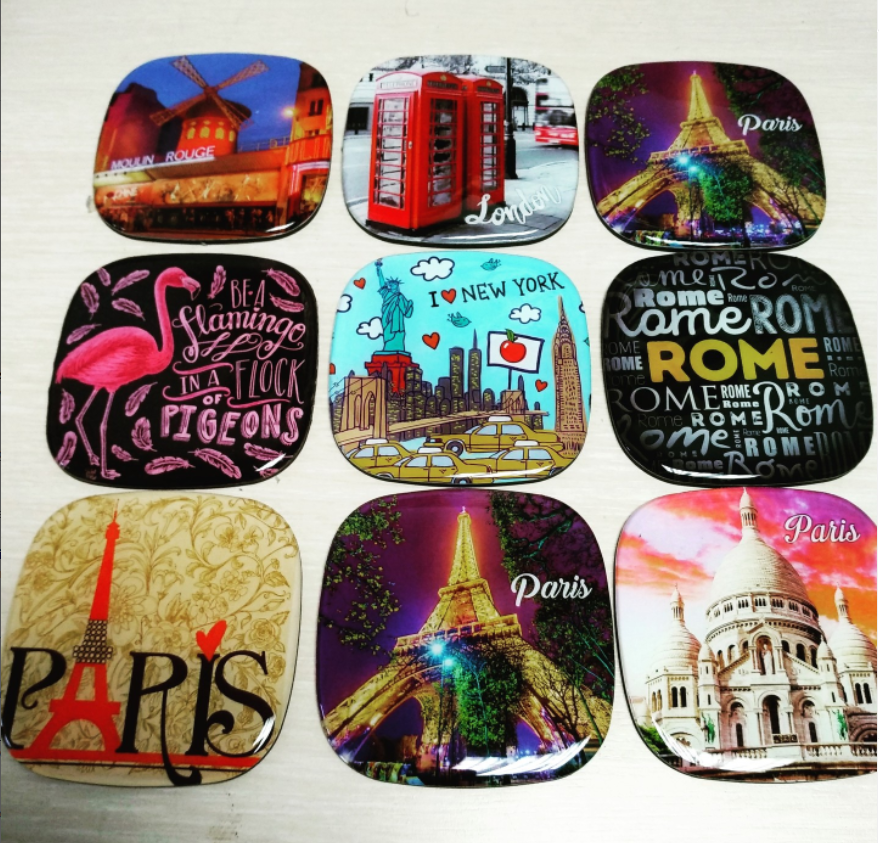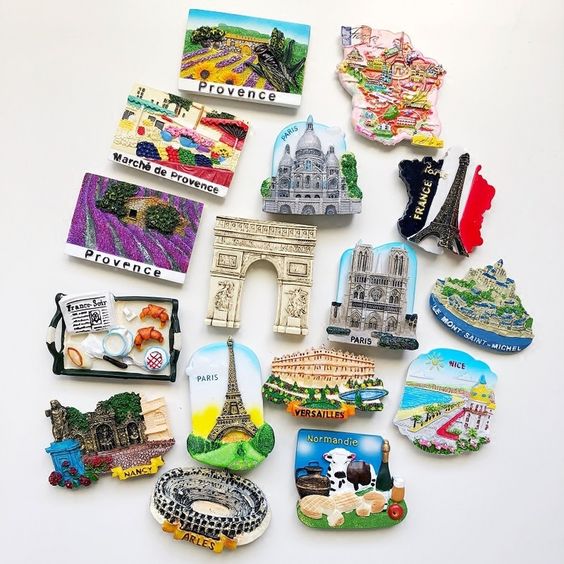As tourism grows around the world, travelers are looking for something unique to remember their experiences by. Souvenirs serve as mementos of trips, yet in an increasingly competitive market, the demand for customized souvenirs has skyrocketed. Whether it’s a personalized gift or a unique piece of art, custom souvenirs are now one of the top choices for tourists and businesses alike. In this guide, we will walk you through everything you need to know about customizing your souvenirs, from the initial concept to delivery, ensuring that you make the best choices for both your business and your customers.
The Rise of Customized Souvenirs in Tourism Retail
Why Customization Matters to Today’s Travelers

Customization has become a significant trend in the souvenir market, as more tourists seek personalized, unique items. Customized souvenirs offer a deeper connection to the place they visited, allowing travelers to take home something truly representative of their journey. Whether it’s a custom snow globe, keychain, or resin figurine, personalized souvenirs often carry more sentimental value than mass-produced ones.
The power of customization lies in its ability to tell a story. When tourists purchase customized items, they’re not only buying a product, they’re buying an experience. In fact, studies show that personalized products tend to resonate better with consumers and are more likely to be purchased because they create a sense of belonging and uniqueness. For souvenir businesses, offering custom options can be a competitive edge.
Consumer Demand for Personalization and Unique Items
Today’s tourists are no longer content with generic mementos. They want souvenirs that reflect their personal experience. Custom souvenirs, ranging from engraved keychains to fully customized figurines, offer an opportunity for businesses to meet this demand. Personalized products are particularly attractive to tourists who are looking for a meaningful reminder of their visit.
With an increasing number of people preferring one-of-a-kind products, there’s an immense opportunity for businesses to capitalize on this trend. Offering customized souvenirs can help businesses tap into this growing market and establish themselves as an attractive destination for tourists seeking unique memorabilia.
How to Approach Customization for Souvenirs
Understanding Your Customers’ Needs and Preferences

The first step in offering custom souvenirs is understanding the preferences of your target market. Whether your customers are families, solo travelers, or corporate buyers, knowing what appeals to them is crucial for designing effective products. Begin by conducting market research—gather data on tourist demographics, popular destinations, and customer expectations. You could also use feedback from previous customers to inform your design process.
For example, if your target market is family tourists, customized souvenirs like family-themed photo frames or resin figurines might be a great fit. If you’re targeting a younger crowd, trendy, minimalistic designs might appeal more.
Key Considerations for Designing Custom Souvenirs
Designing a custom souvenir isn’t just about putting a name or a date on an object. The design must resonate with your customers and align with the cultural identity of the destination. For example, a souvenir from Paris might feature iconic landmarks like the Eiffel Tower, while a souvenir from a beach resort might feature seashells and waves.
In addition to aesthetic appeal, consider the practicality of the souvenir. Will it be easy to transport? Is it durable enough for long-term use? As the souvenir’s purpose is to remind the buyer of their trip, it’s essential that it lasts. High-quality materials such as resin, wood, and metal are ideal for ensuring that your custom souvenirs stand the test of time.
Choosing the Right Materials for Custom Souvenirs
The material of a custom souvenir plays a significant role in both its appearance and longevity. Popular materials for custom souvenirs include resin, wood, metal, and eco-friendly materials. Each material has its own advantages and considerations.
- Resin: This is a popular material for its versatility and durability. Resin allows for intricate details and vibrant designs, making it ideal for custom figurines, snow globes, and more.
- Wood: A traditional material often used for rustic souvenirs. Wood is ideal for handcrafted items and appeals to tourists looking for something more artisanal.
- Metal: Metal souvenirs often have a sleek, modern appearance, making them ideal for chic or luxury souvenirs such as custom keychains or plaques.
- Eco-friendly Materials: As sustainability becomes a growing concern, many businesses are opting for biodegradable or recycled materials to create eco-friendly souvenirs. This appeals to environmentally-conscious buyers and aligns with the green tourism movement.
Working with a Custom Souvenir Manufacturer
Finding the Right Supplier for Custom Souvenirs

Choosing a reliable supplier is one of the most important decisions in the process of customizing souvenirs. It’s crucial to select a manufacturer who understands your vision and can execute it effectively. Look for a supplier with a track record of successful custom projects and positive reviews. Check their portfolio to ensure they have experience working with the types of souvenirs you plan to produce, whether it’s resin figurines, keychains, or eco-friendly products.
When selecting a manufacturer, consider factors such as minimum order quantities (MOQ), pricing transparency, and lead times. Ensure that the supplier has the capability to meet your order requirements and can deliver high-quality products on time.
Understanding the Customization Process
The customization process can vary depending on the type of product and the manufacturer. Typically, the process begins with a design consultation. Here, you will work closely with the manufacturer to finalize the product’s design, materials, and any custom features. This may include logo placement, engraving, or bespoke colors.
Once the design is finalized, the prototype is created. This stage allows you to inspect the product, ensuring it meets your expectations before mass production begins. After approval, the manufacturer will begin producing the custom souvenirs in bulk. Be sure to communicate clearly with your supplier at every step of the process to ensure the end product matches your vision.
The Importance of Quality Control in Custom Souvenirs
Quality control is essential in ensuring that your custom souvenirs meet both your standards and the expectations of your customers. Poor-quality products can lead to dissatisfaction and return issues. During the production process, it’s important to regularly inspect the items to check for any defects or inconsistencies.
Work with manufacturers who have robust quality assurance processes in place. This might include checking the materials, inspecting finished products for design accuracy, and performing durability tests. Ensuring quality control during manufacturing will result in better customer satisfaction and repeat business.
Custom Souvenir Pricing and Profitability
Balancing Customization Costs with Profit Margins

One of the key challenges in customizing souvenirs is managing the balance between customization costs and profit margins. While customized products often have higher production costs, they also offer the potential for higher prices and increased demand.
It’s important to calculate the total cost of production, including design, materials, labor, and shipping, before setting the price. Keep in mind that tourists are often willing to pay more for a product that is personalized, so you can adjust your pricing accordingly. However, be sure to keep your profit margins competitive within the market.
Understanding the Minimum Order Quantities (MOQ) for Custom Orders
Many custom souvenir manufacturers have a minimum order quantity (MOQ), meaning you must order a certain number of units before they will begin production. MOQ varies from manufacturer to manufacturer, but understanding this upfront is critical for planning your budget and inventory.
Some businesses may want to place a small initial order to test the market, while others may need large quantities to meet seasonal demand. When working with suppliers, make sure to discuss MOQs to ensure they align with your business needs.
Case Studies: Successful Custom Souvenir Projects
Example 1: Successful Custom Snow Globe Collection
A souvenir store in a popular tourist destination worked with a manufacturer to create a custom snow globe collection featuring the most famous landmarks of the city. The snow globes were marketed as limited-edition items, and each one was personalized with the traveler’s name, adding an extra personal touch. The custom snow globes quickly became one of the store’s best-sellers.
Example 2: The Power of Personalized Resin Keychains
A souvenir shop specializing in beach destinations collaborated with a supplier to create custom resin keychains. Each keychain was personalized with the name of the beach and a small illustration of the location’s iconic landmarks. The personalized resin keychains proved to be an instant hit with tourists, increasing the shop’s revenue during the peak season.
Conclusion
Custom souvenirs are not just products; they are memories, emotions, and experiences wrapped up in a tangible item. By understanding the process and knowing how to work with the right suppliers, you can create unique and personalized souvenirs that your customers will cherish forever. Whether you are a small souvenir shop owner or a large retailer, offering customized products can be a key factor in boosting your sales and building a loyal customer base.
By taking the time to research, plan, and execute your custom souvenir orders, you’ll be well on your way to offering products that stand out in the crowded souvenir market. Remember to consider customer preferences, design trends, material choices, and quality control to ensure your customized souvenirs are a hit with tourists.
- Resin vs. Ceramic: A Data-Driven B2B Comparison for High-Volume Souvenir Orders - February 4, 2026
- AQL 2.5 vs. 4.0: Defining Acceptable Defect Thresholds for Mass-Produced Tourist Magnets - January 28, 2026
- The Importer’s Guide to Total Landed Cost (TLC): Calculating the Real Price of Resin Souvenirs from Quanzhou - January 21, 2026




